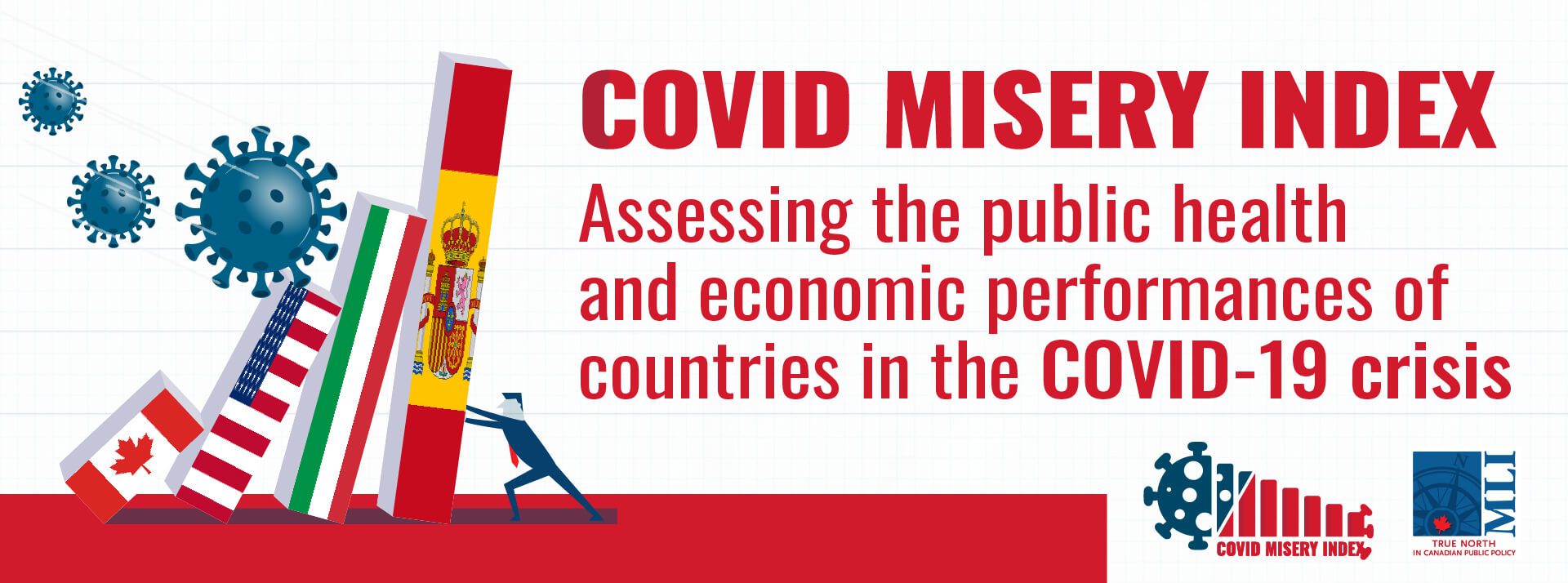View the full, updated COVID Misery Index (CMI) here. Download the data for the August 20 update here. For more information, including a full methodology and analysis of the initial CMI, click here, and view the original, non-updated CMI here.
To find all the MLI products related to the CMI, click here.
The Latest CMI
How quickly are we getting people vaccinated? How tough are the public health restrictions? How is the economy recovering? MLI has the answers with the latest update of the COVID Misery Index.
MLI COVID Misery Index Update (August 20, 2021): The Macdonald-Laurier Institute’s COVID Misery Index is updated regularly as we follow the progress of 15 developed countries to preserve the health, well-being and prosperity of their citizens during the pandemic. There are three categories: Disease Misery, a measure of the impact of sickness and death from the disease, Response Misery, a ranking of how well governments are doing on measures such as the success of vaccine rollouts or having to rely on restrictive lockdown measures, and Economic Misery, which takes into account the impact on jobs, growth and government finances.
Canada’s vaccine roll-out helps it move up the rankings
COVID-19 is proving to have a longer tail than anticipated. The ‘delta variant,’ with its higher transmissibility, makes unvaccinated people more vulnerable to the disease. In fact, there is strong evidence emerging that the impact of this latest wave, and the most serious cases within it, is almost entirely concentrated on the unvaccinated. Getting back to a normal life now rests on how many and how fast people get vaccinated. Evidence from around the world shows that vaccination rates do plateau, so getting the hesitant and the reluctant populations vaccinated is critical for the next phase of the fight against COVID-19.
Despite a slow start, and significant criticism of its roll-out program, Canada now leads our group of 15 countries in terms of take-up of both first and second vaccinations. With lower case counts and – at least until recently – quite stringent public health measures, the delta variant has not taken as strong a hold here as it has in other countries. By contrast the US, which had previously demonstrated a world-leading vaccination roll-out, seems stalled with the slowest per capita vaccination rate in our comparison group over the past week. While the initial roll-out of first doses was exemplary, their inability to reach vaccination rates that would approach herd immunity are a stark lesson for us all.
A high vaccination rate globally remains the key to ending the pandemic.
Given Canada’s leading status in disease management, in recent weeks the country surprisingly fared poorly in Response Misery, as some regions have maintained prolonged stringency measures. In fact, the country’s stringency score rated worst in the group in recent weeks. In many provinces, the roll-back of restrictions has been very slow, frustrating attempts to resume business and social activities.
As little new economic data has been made available, there is no update of the Economic Misery scores in this report. However, Canada retains an “F” grade in this category as the data that is available suggests that economic recovery remains slower here than elsewhere. Additionally, the substantial public debt this country incurred to support Canadians during the early stages of the pandemic will remain a significant concern for the immediate and longer terms.
Competitor rankings
New Zealand remains in first place in the overall rankings, as its ‘elimination’ strategy continues to keep cases limited to those introduced by ex-pats returning home from around the world. Worryingly, however, the very low vaccination rates and limited public health restrictions could leave the country highly vulnerable should the delta variant breach its borders.
Many western European countries appear to be struggling with the latest wave of the disease. The UK has abandoned the majority of its public health restrictions despite relatively low vaccination rates, leaving a large proportion of the population with little or no immunity protection. France, Italy, Spain and Belgium have all struggled recently with increasing rates of disease and the inevitable consequence of more deaths.
Although it was experiencing an increase in cases, Japan has been vaccinating at a much higher rate in recent weeks. While it is not possible yet to determine the full impact that hosting the Olympics had on disease measures, it seems safe to suggest that the increased vaccination rate is a response to the increased risk the country took on by proceeding with the Games.
Australia, which remains highly ranked with a “B+” grade in terms of its overall misery, presently has outbreaks across several states, and the high number of cases in New South Wales is particularly concerning. Many states are in lockdown and the travel bubble which had been opened with New Zealand is now closed indefinitely.
Looking forward
Overall, Canada’s situation relative to the 14 peer countries is much improved with respect to the rates and impact of the disease and the gradual loosening of response measures. Critical to this continued success – and certainly what we will be observing in the weeks to come – is for Canada to continue efforts to reach those not yet or not fully vaccinated. The delta variant, and future variants of concern, will prey on the unvaccinated.
Richard Audas, Faculty of Medicine, Memorial University of Newfoundland. Senior Fellow at the Macdonald-Laurier Institute.





